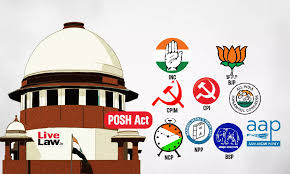

POSH Act Sexual Harassment Not Applicable To Political Parties
The Supreme Court of India has recently ruled that the Sexual Harassment of Women at Workplace (Prevention, Prohibition, and Redressal) Act, 2013 (POSH Act), does not extend to political parties.
On September 15, 2025, the Court dismissed a petition seeking to bring registered political parties under the Act’s purview, stating that political parties do not constitute formal workplaces as defined under the Act. The bench, led by Chief Justice Gavai, expressed concerns that such a move could lead to misuse and potentially be exploited for blackmail, warning against the negative implications such an extension might bring. The petition highlighted the absence of adequate redressal mechanisms within political parties for addressing sexual harassment. It was noted that only the Communist Party of India (Marxist) has established an Internal Complaints Committee (ICC) with external members.
The petitioner argued that the lack of such mechanisms leaves women in political spaces without adequate protection. The Court emphasized that extending the POSH Act to political parties would “open a Pandora’s box” and could become a tool for blackmail. It suggested that the issue falls within the domain of policymakers and is a matter of legislative policy. This ruling has sparked discussions about women’s safety in politics and the need for effective mechanisms to address sexual harassment within political partie
A three-judge bench led by Chief Justice BR Gavai said political parties are not workplaces as defined by the law. The Court explained that joining a political party is voluntary and does not create an employer–employee relationship. Therefore, the Sexual Harassment of Women at Workplace (Prevention, Prohibition and Redressal) Act does not apply.
“Party workers are not employees. Political parties do not offer jobs or salaries,” the bench observed. It also warned that expanding the law’s scope could lead to misuse and political blackmail.
The Case and Its Argument
Activist Yogamaya M.G. filed the petition. Her lawyer, Shobha Gupta, argued that women in political parties face regular harassment. However, most parties lack any formal redressal mechanism. She pointed out that the CPI(M) has a complaints committee, but major parties like the BJP, Congress, and AAP have no such structure—or do not make it public.
Gupta urged the Court to interpret the POSH Act in the spirit of the Vishaka Guidelines, which promoted safety in all work-like settings, not just formal jobs. But the Court disagreed. It held that unless women receive wages or employment contracts, they cannot claim protection under this Act.
Where the POSH Act Applies
The POSH Act ensures protection for women against sexual harassment at all formal workplaces. It applies to:
- Government departments
- Private companies with 10 or more employees
- Educational institutions
- NGOs and hospitals
- Gig workers and remote employees
Every eligible organization must form an Internal Complaints Committee (ICC). For smaller setups or when the complaint is against the employer, the district-level Local Complaints Committee (LCC) takes charge.
To help women file complaints easily, the government also created SHe-Box, an online platform that redirects complaints to the proper committee.
What the Data Shows
Cases under the POSH Act have risen sharply in recent years.
In FY 2023–24, 2,325 complaints were reported by 700 NSE-listed companies. This was a 29% increase from 1,807 complaints in FY 2022–23.
However, not all cases received timely resolution. The number of pending complaints grew from 260 to 435 in the same period—an alarming 67% jump.
Large corporations like TCS reported a sharp increase. TCS alone received 110 complaints in one year. Among BSE-30 companies, POSH complaints rose to 958 in FY 2024–25, compared to 902 the previous year.
While these numbers show that women are speaking up more, they also reveal serious gaps in enforcement. Delays and backlogs undermine the law’s effectiveness.
Impact of the Verdict
This Supreme Court decision leaves women in political parties without legal protection under POSH. Since the Court ruled that parties are not workplaces, they don’t need to set up complaints committees. This creates a major loophole.
The burden now falls on political parties. Without a legal mandate, it’s up to each party to build its own mechanism. Some may do so voluntarily, but many may ignore the issue entirely.
Experts warn that this could discourage women from joining politics. Grassroots workers are especially vulnerable, as they often work in informal and male-dominated spaces.
To fix this gap, the government may need to amend the law or pass new legislation specifically for political entities. Until then, women in politics remain at risk without clear channels for justice.

Prabha Gupta is a veteran journalist and civic thinker dedicated to the constitutional ideals of dignity and institutional ethics. With over thirty years of experience in public communication, her work serves as a bridge between India’s civil society and its democratic institutions. She is a prominent voice on the evolution of Indian citizenship, advocating for a national discourse rooted in integrity and the empowerment of the common citizen









